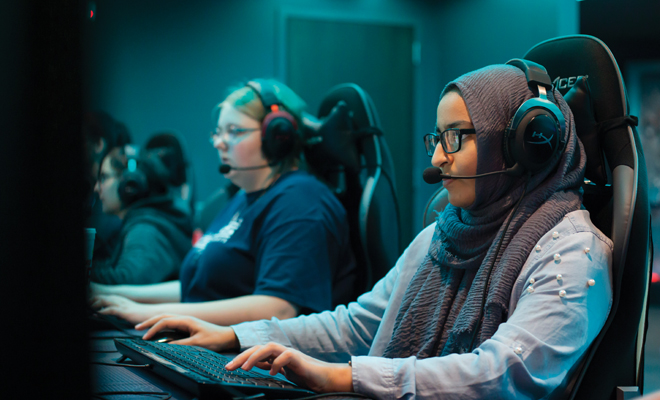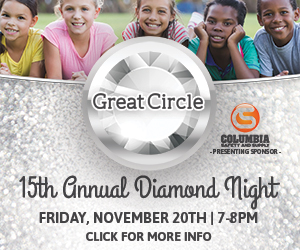 Kaci Smart
Kaci Smart
Girls Who Game: Developing Confidence, Communication and STEM Skills
Safe and supportive spaces are essential to every community, and it’s even more important for girls in middle school and high school. Lindsay Zeiter, Ph.D., online program coordinator of Columbia College’s School of Natural Science & Mathematics and Girls Who Game coordinator, is in the thick of creating such an environment in Columbia, Missouri.
HERLIFE Magazine talked with Lindsay to gain insight into the gaming culture and the programs offered by Girls Who Game, or GWG.
HLM: Tell us about the Girls Who Game program.
LZ: The Girls Who Game goals are to grow a safe, supportive community that empowers girls to embrace their passion for gaming, to ignite girls’ interest in STEM careers, to increase awareness of the need for women in STEM careers, and to establish a pipeline for girls in competitive eSports. We provide education and encouragement for the purpose of advancing gender equity for girls in the gaming community.
The GWG program invites middle and high school girls with a passion for gaming to engage in cooperative and competitive play while learning about career opportunities in the gaming industry. We host a few events throughout the year in addition to our summer camp.
We also host occasional members’ events so the girls can come to campus, game together with us in the Game Hut, and talk with our Columbia College faculty and students. These events keep the girls connected throughout the school year and maintain a focus on both academic and team skills.
HLM: How did this program get started? What is it accomplishing for young women?
LZ: According to the 2015 national report card for Missouri, middle-school and high-school girls are falling behind in STEM subjects. For example, while fourth-grade girls in Missouri are currently performing on par with their male peers in science, eighth-grade girls are falling behind by 4 points, on average. For this reason, the Girls Who Game camp serves middle-school to high-school aged girls in Missouri. Through the lens of gaming, the program aims to transform girls’ raw passion and talent into college and career readiness, creating pathways to competitive eSports and ever-growing STEM careers in the future.
Feedback from previous participants in the Girls Who Game pilot camp indicates a great need for safe, equitable spaces for girls and women in the gaming and STEM industries. This includes transgender girls who also may not have safe spaces to cultivate their eSports skills. Initial activities have been overwhelmingly positive for girls, who consistently state that they cannot wait for the next Girls Who Game event. This is evidence that we have great potential to capture and maintain their engagement in STEM-related activities in the future.
HLM: What is your part in the program? Why were you drawn to it?
LZ: I am passionate about gaming myself, so I jumped at the opportunity to get involved with this initiative. I’ve been gaming since I was very little, age five or so; I have fond memories of playing the original Nintendo with my Dad. As I got older, I would play games more with my brothers, and then with my husband. My husband is an Army veteran, and when he was still in there were times when we would have to be apart for extended lengths of time. We would have “Call of Duty dates” to spend time together while apart.
I am one of the lead coordinators for the GWG organization. I work with our faculty, staff, coaches and players to plan and facilitate our events. I help keep our gamer girl community connected by moderating our Girls Who Game Discord and communicating with our members about upcoming events.
Gaming is becoming more and more a part of our mainstream culture, and the industry is experiencing explosive growth. Women make up half of the gamer market, and yet they still make up only about a fifth of the gaming workforce. Games are such a powerful art medium; they can deliver powerful emotional, visual and musical experiences. They touch on some of our basic psychological desires for autonomy, competence and social interaction. It is important to support the growth of diversity in the gaming industry, and that is a major reason I am so passionate about Girls Who Game!
HLM: What is the one thing you’re most proud of with this program and group of girls?
LZ: So many of our girls have shown such an increase in their confidence! They’ve gone from just thinking games are fun to really embracing the development process with the belief in their own potential to make something amazing. After last year’s summer camp, one of the camper parents shared with me that her daughter came home and said, in reference to game development, “I think I can really do this!” A few of our girls have participated in the local community Game Jams. One of them won the Best Tabletop category with her original card game, and another has won the Best Art category three Game Jams in a row! The girls all have their own talents, and it is wonderful to see those talents recognized by others in the community.
I’ve also observed major improvements in communication among teammates. We play League of Legends together, and it is a complex game. When the girls first started playing together competitively there was a lot of enthusiastic yelling without the delivery of useful information. Now the girls are calling on each other using their names and sharing specific information about what help is needed where. They check in with each other when they find themselves in a situation where they are available to support another player. They coordinate their movements and tackle objectives as a team. They also analyze their own strengths and weaknesses and are constantly working to improve. They show such drive and dedication. And they power through frustrating moments with the support of their peers.
HLM: What do you hope to accomplish moving forward?
LZ: I hope that we will see continued growth, both as a community and personal growth in each of our gamer girls. I hope to make more industry connections, take more field trips, and facilitate more community involvement to continue working toward our goals. I think there is potential for our longer-standing members to take on leadership roles and mentor our newer members. I see this organization as part of a larger effort to move toward gender equity in the gaming industry and eSports. There are major companies and studios that are a part of this effort, but organizations at the local, community level such as ours are just as important! ■
To learn more about Girls Who Game, contact Lindsay Zeiter at 573-875-7405 or lzeiter@ccis.edu.








